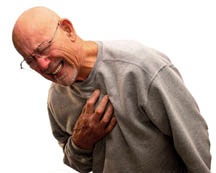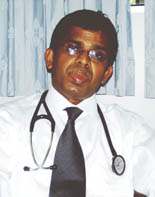|
observer |
|
|
|
|
|
OTHER LINKS |

|

|

|
Your smart heartIt was just another day for Mrs. Malani Perera. Except for her loneliness, she was quite normal throughout the day, till she got the terrible heart pain that night. A retired teacher, the 72-year-old mother of two, lived in a neighbourhood, where, everyone mind their own business.
As the mild chest pain was progressing, she knew that something was wrong inside. No one around to ask for help, she first thought of dialling for the ambulance service but abandoned the idea because she thought that the blaring siren of the vehicle would disturb the residents of their posh neighbourhood. Instead, she called her daughter, lived a few miles away who arrived home an hour later. She was rushed to the Colombo National Hospital but within few minutes of Mrs. Perera's heart ceased to function. Like Mrs. Perera, many die after paying scant regard to for a mild chest pain, which is a warning sign of a major disaster, while others not because of their ignorance but just not bothered to inform anyone. "People, especially the elderly, need to be aware about the warning signs and the most important step is to act immediately when the first warning signal appears. Then, one can have hopes about life and also this will prevent the damages to the heart", says Dr. Gotabeya Ranasinghe, Consultant Cardiologist of the Colombo National Hospital. With changing life styles, Cardio Vascular Diseases (CVDs) have emerged as a major health concern worldwide. It contributes to 53 million deaths and out that 5.5 million are from the developed countries. It kills 9.7 million people in developing countries annually. The early identification of the risk factors and immediate measures to be taken, the number of people vulnerable to CVDs, including heart attacks has come down drastically in developed countries. Awareness programs, advanced technology to detect them early and modern treatment methods have also contributed in bringing down the prevalence rates in these countries.
"But" Dr. Ranasinghe says "unfortunately this scenario is different in developing counties as the prevalence rate of the CVDs is increasing significantly". According to Dr. Ranasinghe, especially in the South East Asian counties including India, Pakistan, Bangladesh and Sri Lanka, are vulnerable for CVDs. He says the two phenomena - the urbanization and industrialization - have a great impact on escalating number of CVD cases as they change the lifestyles of those moved to urban areas. "Ultimately sedentary life styles and changes in dietry patterns will contribute to hypertension, cholesterol, stress and smoking, which are identified as the major factors for CVDs." he pointed out. Dr. Ranansinghe says that detecting a heart attack is a very important task since early treatment can prevent damage to the heart or even death. To detect a heart attack, the symptoms, which are the warning signals released by the body, are very important, Knowing the minor pains or discomforts that come from the chest is important enough to rush to hospital to seek medical help. "When you try to imagine a heart attack, naturally the mind goes to the chest pain, but, it is not. In the early stages you may not get a chest pain but a discomfort, bringing a feeling of heaviness or tightness or an unnatural feeling, which is difficult to describe. This may be the earliest sign of a serious heart attack before progressing into a full-blown one", Dr. Ranasinghe says. He warns that if you neglect the pain it will progress to a serious heart attack within 10 to 15 minutes. According to Dr. Ranasinghe, there is no exact time frame and it differs from person to person. If he or she had suffered from some sort of chest discomfort earlier this could be a warning sign for an impending attack", he adds. He says more and more young people - below the age of 25 are vulnerable to heart attacks due to changing lifestyles. The age limit for heart attack for men is 40 years and women 55 but the trend now is more young people are prone to heart attacks with significant rise in the number of cases with hypertension, diabetes and smoking. "A young person with a heart attack is very rare in Sri Lanka 15 years ago but now a significant number of young ones seek medical help for heart complications. So, healthy young people who engage in physical activities can also be prone to heart diseases if they do not observe the risk factors" he advises. Personal myths like 'I am a woman so I will not get a heart attack' or 'I am healthy so I will not get a heart attack' or 'I do jogging everyday so I will not get an attack', will put a person's heart at risk. According to Dr. Ranasinghe, no one can say that he or she is free from sudden attacks and the best thing is to beware the warning signals and to act immediately to save one's life. And also one should not delay seeking treatment even for a minor chest pain. Never put it off with excuses like; Until husband or wife gets up...until son comes home or...until the neighbourhood wake up. Warning signs of heart attacks need prompt medical care and this will help avert heart failure and sudden deaths. Better awareness on risk factors of the heart attack is the best hope for battling the killer attack. "If you know about risk factors you can prevent heart attacks and also reverse the coronary heart diseases. The other important factor is if you already have the disease your heart artillery has already narrowed and when you know the risk factors you can prevent further narrowing of the artillery" says Dr. Ranasinghe. **** Balanced diet saved the heartFast food is fostering a culture of laziness. So balanced diet with right quantity of calories, fat vitamins and minerals will prevent many diseases including heart diseases. When it comes to cholesterol there are certain things that need to eat less amount like bad fat - trans and saturated fat. Saturated fat, which found in animal products including fatty meats - beef, pork, mutton and whole milk, ice cream, cheese, butter and vegetable oil like coconut and oils. Trans fat are found in basically in processed food. They are result of hydrogenation, which means adding hydrogen to vegetable oil. These fat forms when liquid oil is turn into solid fat such as margarine. The fat forms are considered dangerous because they not only alleviate the bad cholesterol because of lowering the good cholesterol in the body. The trans fat are accountable for epidemic of obesity and increasing cholesterol levels among children and adolescents especially in developing countries. In addition trans fats are found in margarine and fried food, processed food and commercially baked food like crackers, cookies, muffins doughnuts and all sorts of popular fast food. Try to increase the good fat which contains in varies oils like olive, canola, sunflower, Soya beans and corn. These are good fat. Varieties of nuts wallnuts, cashewnuts, hazelnuts contain good fat. Fish oil with omega 3 is also considered as good fat. What is heart attack?Heart attack is called Myocardial infarction. It occurs when supply of blood and oxygen to one section of the heart muscles becomes blocked. The blockage is caused by a combination of clot and cholesterol inside the artery. Since heart muscles require a constant flow of fresh blood and oxygen to keep pumping blood to each and every organ of the body, the heart attack could be dangerous. A full-blown typical heart attack is unbearable pain. Pain may be located in the centre of the chest towards the left. And it could radiate to the left shoulder or right shoulder or towards the neck, teeth, jaws, ears or the back. The pain may traverse down the arm. The pain usually starts from the left but could shift to the right later. Things to do when one gets a heart attack: 1. Not to ignore mild chest pain. 2. Inform somebody 3. Seek medical help immediately 4. Stop all work and lie down. 5. Take an asprin (Not panadol), which has the potential of dissolving blood clots. |
 Her son, a high ranking officer in the police had placed all phone
numbers at her disposal to dial in an emergency and her daughter, a
lecturer, at a University has given her mobile number and a few
relatives' contact numbers when mother needs help. Even after the death
of her husband, she did not move in to her children's homes, preferring
to be independent.
Her son, a high ranking officer in the police had placed all phone
numbers at her disposal to dial in an emergency and her daughter, a
lecturer, at a University has given her mobile number and a few
relatives' contact numbers when mother needs help. Even after the death
of her husband, she did not move in to her children's homes, preferring
to be independent. 








